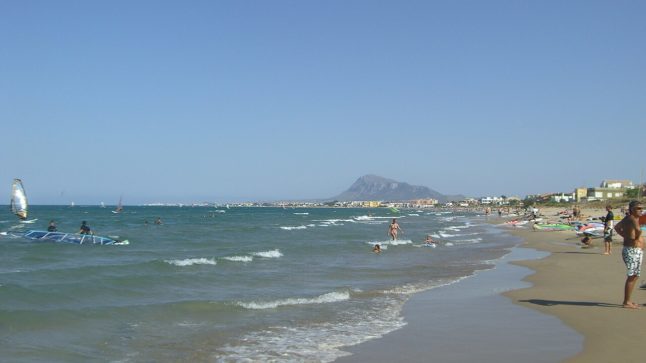Some 3,600 residents of 100 properties (apartment blocks and houses) along the beachfront of Les Deveses beach in Alicante province will likely be forced to leave their properties in the future, due to fact that their homes now breach the rules of the Ley de Costas (Coastal Law) and prevent the regeneration of the area, damaged by Storm Gloria in 2020.
Spain’s complicated Coastal Law first came into force in December 1989 to control Spain’s rampant seafront construction and was amended in 2013, 2014 and 2020. It essentially regulates the areas of the beach and coastline that are public and belong to the state and those that are privately owned.
The line that divides the two areas is referred to as the demarcation line, el deslinde. Due to numerous changes to the law and Spain’s receding coastline, beach areas that were once private land have now been reclassified as public land, without the owners being able to do much about it.
Denia is one of the Alicante municipalities that is most affected by the issue, although there are others on the same coastline, with over 10 kilometres of beach.
Spain’s Ministry of Ecological Transition has estimated a further 1,700 homes could suffer the same fate in Denia.
Owners whose properties have already breached the demarcation line are no longer able to refurbish or adapt them, even when they suffer damage from storms that cause the land to regress and the sea to advance.
Denia resident María Amparo Pérez told national broadcaster RTVE she can’t do any work on her property and if for example a part of her garden wall falls, she won’t be allowed to fix it.
“The Spanish government is robbing us,” José Manuel, another affected resident whose beachfront home has been in the family for 45 years, told La Sexta news about their potential eviction.
Despite the outrage shown by affected locals, Alicante’s Coastal Department is likely to give them another 30 years to continue living in their beachfront properties, so the evictions are not imminent.
Some of the affected neighbours have already protested because the satellite images on which the measurements of the line are based were taken in 2020 and the landscape has already changed since then due to rising sea levels.
There are more than 50 associations that exist along the entire Spanish coast which aim to protect both the beaches and the rights of the citizens.
The associations of Playas Norte de Denia (APND) and Playa Deveses-Basot have more than 800 members and warn that “all the residents of Denia are very concerned since, in many cases, this means the loss of ownership of our homes, legally constituted and built more than 100 years ago”.
“They’re taking our properties and offering nothing in return,” Pedro Pastor, Denia representative for the Association of People Affected by Spain’s Coastal Law, told La Sexta.
In the case of Les Deveses beach, the regeneration of the coast will create more than 20 metres of shoreline, but before it’s complete, residents could be “stripped” of their possessions and their properties will go from urban to rural classification, which means they will “not able to get planning permission and, consequently, be subject to confiscation and demolition”, the associations argue.
The general director of coastlines of the local Valencian government Vicente Martínez Mus has promised to fight against the evictions, which he considers to be unfair for those affected.
However, the problem is not simply down to the law and the division of private and public land, climate change is making everything more complicated.
José Serra Peris, Professor of Coastal Engineering at Valencia University explained that “Close to eighty percent of our coastline is receding, some fronts are completely in recession and beaches are at of disappearing… “In some cases, this would also mean the disappearance of infrastructure, residential, agricultural and industrial areas. It must be noted that we are not only losing beaches, we are losing territory, we are losing economic resources”.



 Please whitelist us to continue reading.
Please whitelist us to continue reading.
Member comments